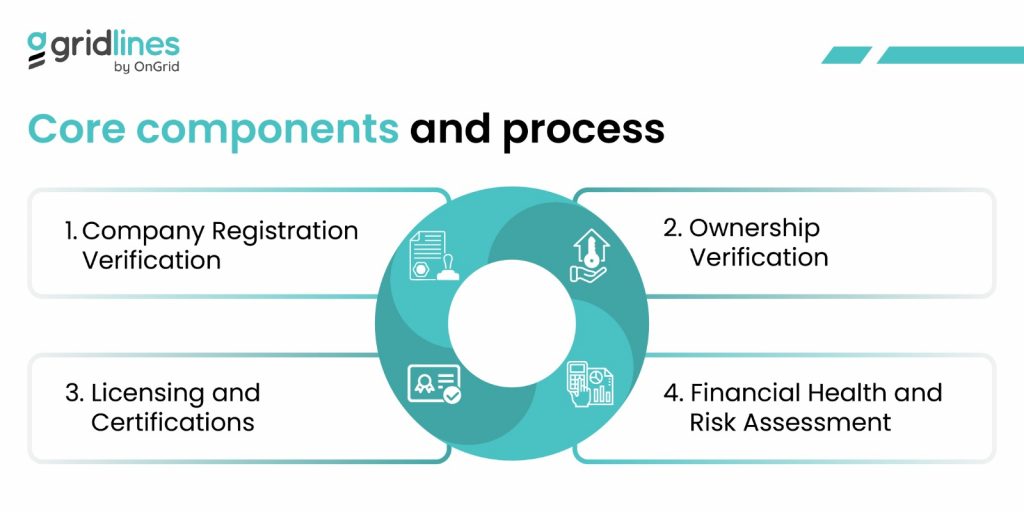Know Your Business (KYB) verification has become a cornerstone in the digital age, enhancing corporate compliance, financial transparency, and trust. Originally a regulatory response to growing financial crime, KYB now offers companies streamlined solutions to authenticate partners and mitigate risks. Let’s explore the history, implementation, and future of KYB, with particular focus on how Gridlines implements KYB through diverse, API-powered verification.
The Origins of KYB: A Response to Risk
KYB’s origins date back to anti-money laundering (AML) initiatives, which gained traction in the early 2000s to prevent illegal business activity. Global regulators, concerned with rising financial crimes, mandated due diligence on entities. KYB practices grew out of these regulations, applying to any institution engaged in transactions and partnerships with businesses, including banks, lenders, and digital marketplaces.
KYB began as a counterpart to Know Your Customer (KYC) practices, which verify individual clients. However, KYB goes deeper, covering corporations’ ownership, legal status, and operational legitimacy.
Why KYB Verification Matters
Today, KYB verification ensures that a business is compliant, licensed, and operating within legal bounds. With digital ecosystems expanding rapidly, KYB has taken center stage for mitigating risk in sectors like finance, technology, and e-commerce. Verifying a business partner protects against fraud, money laundering, and potential reputational damage. KYB processes involve multiple checkpoints, from verifying registration and licenses to cross-checking ownership. This not only safeguards businesses but also ensures a level playing field in competitive markets.
How KYB Verification Works

KYB implementation is not a one-size-fits-all process, as it adapts to specific industry needs and regulatory frameworks. Generally, the process includes the following components:
1. Company Registration Verification: Confirms a business’s legal existence and status.
2. Ownership Verification: Checks ultimate beneficial owners (UBOs) and identifies individuals holding significant control.
3. Licensing and Certifications: Ensures the business holds all required permits or licenses relevant to its industry.
4. Financial Health and Risk Assessment: Often includes financial background checks, credit scores, and risk assessments.
For global companies, KYB is complex due to varying international regulations and standards. This is where automated verification providers, like Gridlines, streamline the process through robust APIs and compliance tools, enabling businesses to conduct KYB at scale without sacrificing accuracy or speed.
Gridlines and KYB: Leveraging Technology for Seamless Verification
Gridlines offers automated, API-driven KYB verification to help companies manage and minimize their risk of onboarding fraudulent or non-compliant businesses. Gridlines tackles multiple verification checkpoints through specialized APIs, covering essential areas such as:
- GSTIN Verification: Confirms the Goods and Services Tax Identification Number of businesses in India, ensuring they meet local tax regulations.
- Bank Account Verification: Validates linked business bank accounts, reducing the risk of payment fraud.
- Company Verification: Ensures a company’s legal status, ownership structure, and operational legitimacy.
- MSME Verification: Verifies credentials of small and medium enterprises, a crucial step for businesses operating in the highly dynamic MSME sector.
- Shop and Establishments Verification: Checks the legal registration of retail and service businesses, essential for B2B transactions in consumer-facing industries.
- FSSAI Verification: Confirms food businesses hold licenses from the Food Safety and Standards Authority of India (FSSAI), mandatory for the food and beverage sector.
By automating these checks, Gridlines enables businesses to accelerate KYB verification, reducing onboarding times and enhancing trust. This tailored approach not only ensures compliance but also builds a secure ecosystem that deters fraudulent activities and streamlines business operations.
The Role of APIs in Modern KYB
API-driven KYB systems are now an industry standard. APIs (Application Programming Interfaces) allow different software components to communicate, providing seamless data exchange between verification tools and businesses. Gridlines leverages APIs to offer modular KYB solutions that can be integrated into existing systems, making the verification process scalable and adaptable to varied business needs.
For instance, a company that needs to verify business partners in real time can integrate Gridlines’ API into its onboarding platform. This setup enables continuous monitoring, as APIs fetch updated information, alerting companies to changes in a partner’s compliance status or legal standing. This real-time, automated approach makes it easier to conduct KYB across regions and at higher volumes without sacrificing accuracy.
Current KYB Challenges
Despite advancements, KYB is not without its challenges. Some of the major hurdles include:
1. Data privacy regulations: Different countries have unique data protection laws, such as GDPR in Europe and CCPA in the U.S., which impact KYB compliance strategies.
2. Data accuracy and quality: Poor-quality data can hinder verification accuracy, as incomplete or outdated records can lead to erroneous assessments.
3. Regulatory complexity: Navigating the evolving landscape of global compliance requires agility. As new regulations arise, businesses must adjust their KYB processes to remain compliant.
4. Scalability: For enterprises onboarding a high volume of partners, maintaining a reliable KYB system requires advanced infrastructure that can scale without sacrificing processing speed or data integrity.
Gridlines addresses these challenges by providing high-quality, regularly updated data from trusted sources and adhering to international compliance standards. Its APIs enable scalable and agile KYB processes that adapt to evolving regulations.
Future Trends in KYB: Toward a Digital Trust Ecosystem
KYB is rapidly evolving to keep pace with digital transformation and the growing demands for compliance. Key trends that will shape the future of KYB include:
- Biometric authentication: Integrating biometric checks could become part of the KYB process to further confirm business owner identities, especially in high-risk industries.
- Blockchain for transparency: Blockchain technology holds promise for KYB, as its transparency and immutability make it ideal for verifying business legitimacy and ownership structures.
- AI-enhanced verification: Artificial intelligence will play a larger role in risk assessment, enabling predictive analysis and real-time fraud detection.
- Decentralized identity verification: Decentralized systems may allow businesses to securely control their verification credentials, enhancing privacy while maintaining compliance.
These trends suggest a future where KYB processes will be faster, more secure, and more integrated with broader digital ecosystems. The automation and accuracy offered by solutions like Gridlines’ API-based KYB will be crucial as businesses navigate this landscape.
KYB as a Strategic Investment
As the demand for digital trust intensifies, KYB verification has become an indispensable tool for companies aiming to mitigate risks and foster secure partnerships. Gridlines, with its comprehensive, API-driven KYB solutions, helps businesses navigate the complexities of compliance while ensuring efficient, reliable verification. In a world where trust is increasingly digital, investing in robust KYB is not just about meeting regulatory requirements—it’s a strategic move to build a resilient, compliant, and trusted business ecosystem.





Leave a Reply